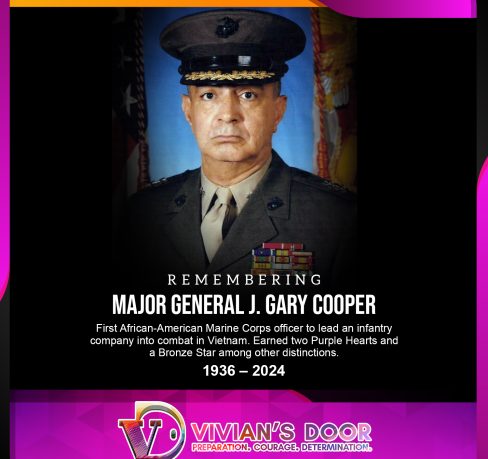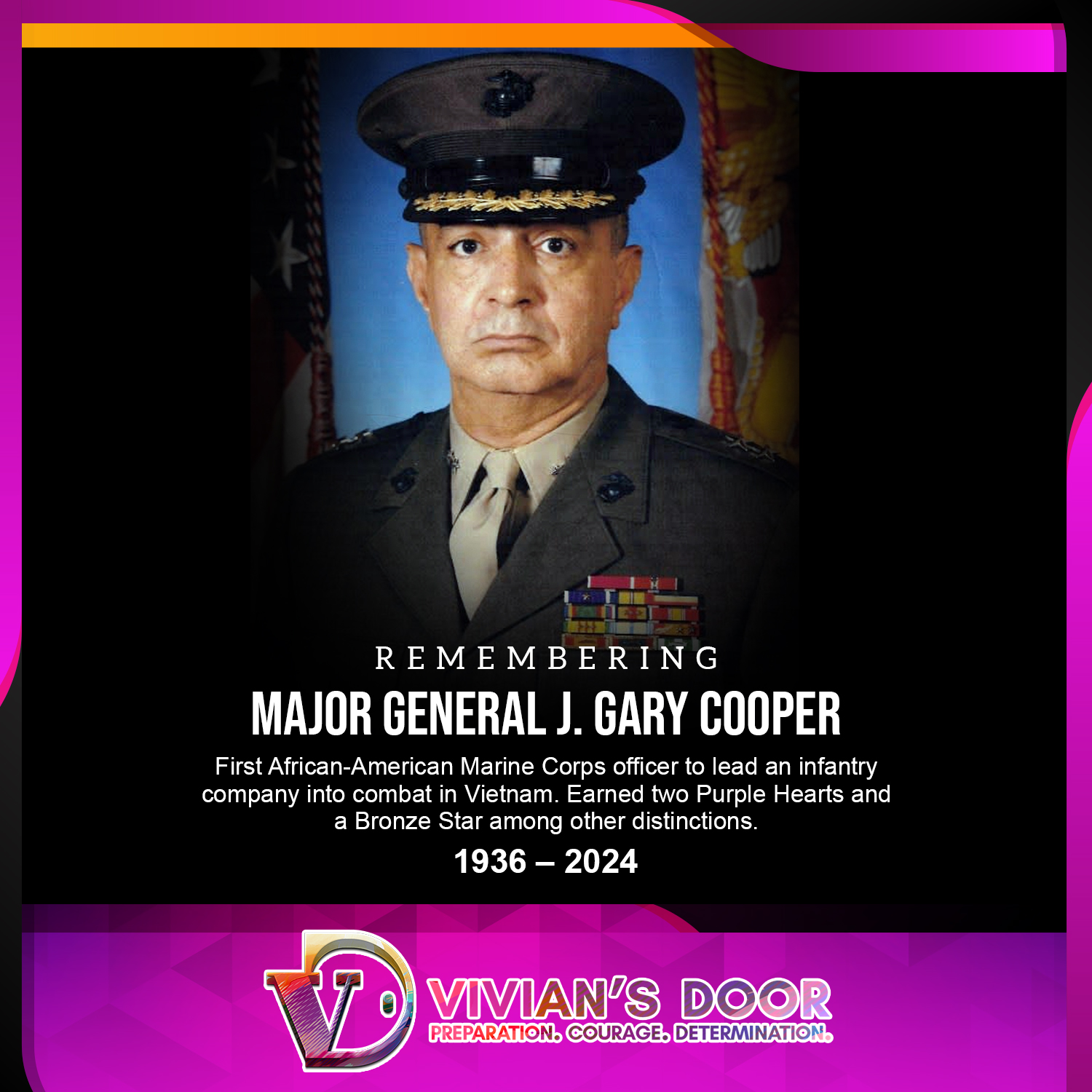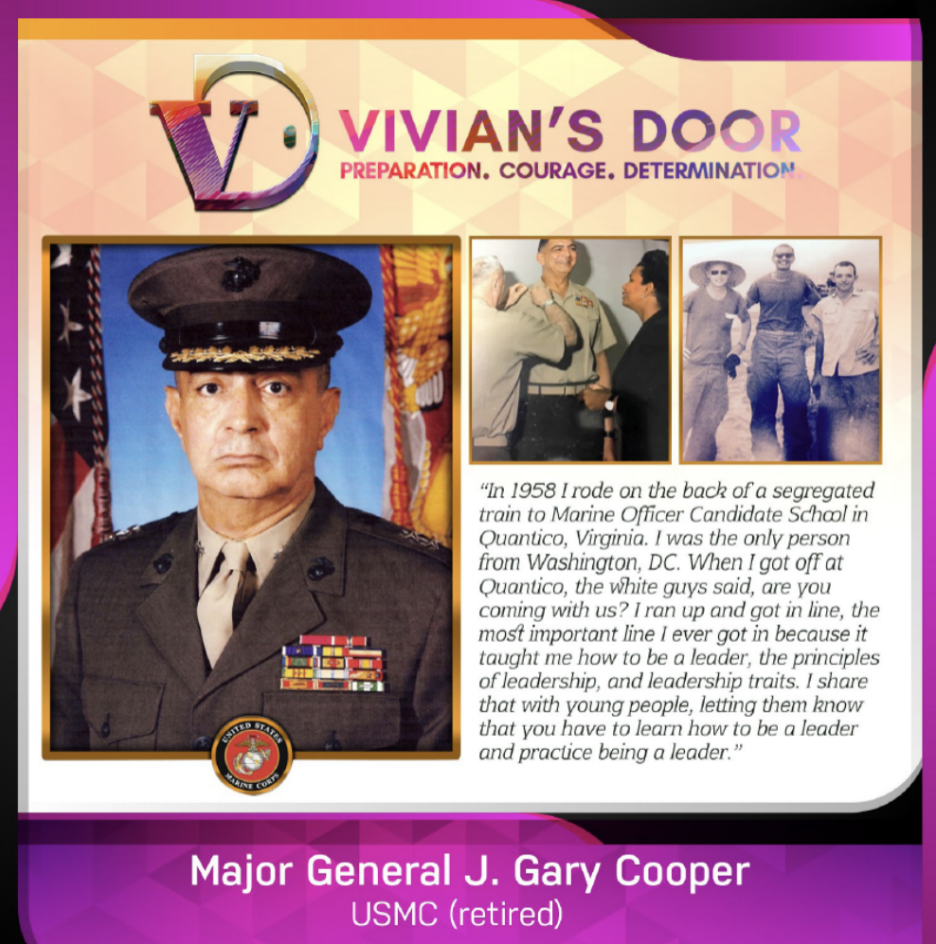A Hometown Hero Standing Tall: Celebrating the Legacy of General J. Gary Cooper

A Hometown Hero Standing Tall: Celebrating the Legacy of General J. Gary Cooper
Jerome Gary Cooper was born in a devout Catholic family on October 2, 1936, in Lafayette, Louisiana. He grew up in the 1950s in the “Down the Bay” community of Mobile, AL, a segregated urban area in the South. Cooper says, “The streets were dirt and such, but we had a movie theatre called the Harlem Theatre, and on Sunday, they had a double feature, which meant that you could see the movie twice. So, I went one day to see a movie when I was around 15 years old. The film “Sands of Iwo Jima” was playing. It was about the World War II Battle of Iwo Jima, a 1949 war film starring John Wayne as Sergeant John Stryker. I was so impressed with that movie’s action. At that point, I knew inside that I wanted to be like anybody who was that strong, smart, and wild. That was the first time I had heard of the Marine Corps, but I made my mind up after seeing that movie that I wanted to be a Marine.”

Cooper did not know at that time that his dream would become a reality. However, based on a recommendation from Archbishop Fulton Sheen of New York, Cooper won an academic scholarship to the University of Notre Dame in Indiana, from which he graduated with a Bachelor of Science Degree in Finance in 1958. Cooper says, “I got commissioned as a Marine officer the day I graduated from Notre Dame University. I rode on the back of a segregated train to Quantico, Virginia, where we had our officer’s training school. I was the only person from Washington, DC, and when I got off at Quantico, the white guys said are you going with us? And I ran up and got in line. I tell everyone that this was the most important line I ever got into because it taught me how to be a leader. It taught me the principles of leadership and leadership traits, and I try to share that with young people today, letting them know that you must learn how to be a leader and practice being a leader.”
Cooper says, “When I got commissioned, there were 20,000 officers in the Marines, and only six were black. On that day, I knew that I had no choice but to be the absolute best I could be.” From 1958 to 1970, he was an active-duty officer and became the first Black officer in Marine Corps history to lead an infantry company into combat. “Everywhere we went, people watched us; at the commissary; at the post exchange, people watched us because they had never seen a black Marine officer. Although it was only six of us, we made it a point that if we didn’t look as good as everybody else, we would go home and change clothes because we were standing on our ancestors’ shoulders and needed to represent.”

Cooper is no stranger to entrepreneurship. In 1970, he became the CEO of his family’s insurance company and funeral home, Christian Benevolent Funeral Home, in Mobile, AL. In 1976, he helped to found Commonwealth National Bank (CNB), a full-service nationally chartered commercial bank. CNB is one of only 23 black-owned banks remaining in the country and one of only five black-owned banks regulated by the Office of the Comptroller of Currency (OCC). Out of forty-two banks operating in Mobile, AL, CNB is the only bank headquartered in Mobile, reflecting its unique local presence and community focus. Giving Black small businesses their wings is one thing that Cooper strives to do through the bank. “He says being a veteran is great, but you have a real challenge if you’re a Black veteran-owned business. As shown in the current election polls, Alabama is a conservative state, with 65% of the population trending conservative. To remain profitable and relevant, you must work hard to get as much support as you can from the Black community and then reach out to others to gain their support. Cooper said, “I asked a minister the other day, why don’t you bank at your hometown bank, the only bank headquartered in Mobile, and he said General Cooper, we’re out in West Mobile; it’s inconvenient for us to come to your bank.”











